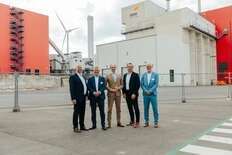- The plant has an annual capacity of 180,000 tons and generates 150,000 MWh of process steam.
- It saves 15 million cubic meters of natural gas and avoids 27,000 tons of CO₂ emissions.
- The investment exceeded €60 million, enhancing circular economy solutions.
- The facility enables phosphate recovery, a critical raw material for agriculture and industry.

Plant Capacity and Environmental Impact
EEW Energy from Waste Delfzijl B.V. has launched a new mono-sewage sludge incineration plant in Delfzijl, Netherlands, with an annual capacity of 180,000 tons. The facility generates approximately 150,000 MWh of climate-friendly process steam, saving 15 million cubic meters of natural gas annually and reducing CO₂ emissions by 27,000 tons.
Investment and Strategic Importance
With an investment exceeding €60 million, the plant enhances Delfzijl's role in circular economy solutions and the Dutch energy transition. The site is strategically important for combining innovation with industrial integration, serving as an innovation hub for pre-sorting plastics and preparing CO₂ capture pilot projects.
Resource Recovery
The facility ensures safe sewage sludge treatment and enables the recovery of valuable phosphate, a critical raw material for agriculture and industry. This aligns with the broader goals of resource conservation, energy production, and environmental protection.
Long-term Commitment
EEW has invested over €400 million in the site's development, operating four facilities with goals of safe disposal, reliable energy, and regional heat supply. This positions Delfzijl as a flagship project for the Dutch energy transition and supports EEW's ambition to lead in the circular economy.

